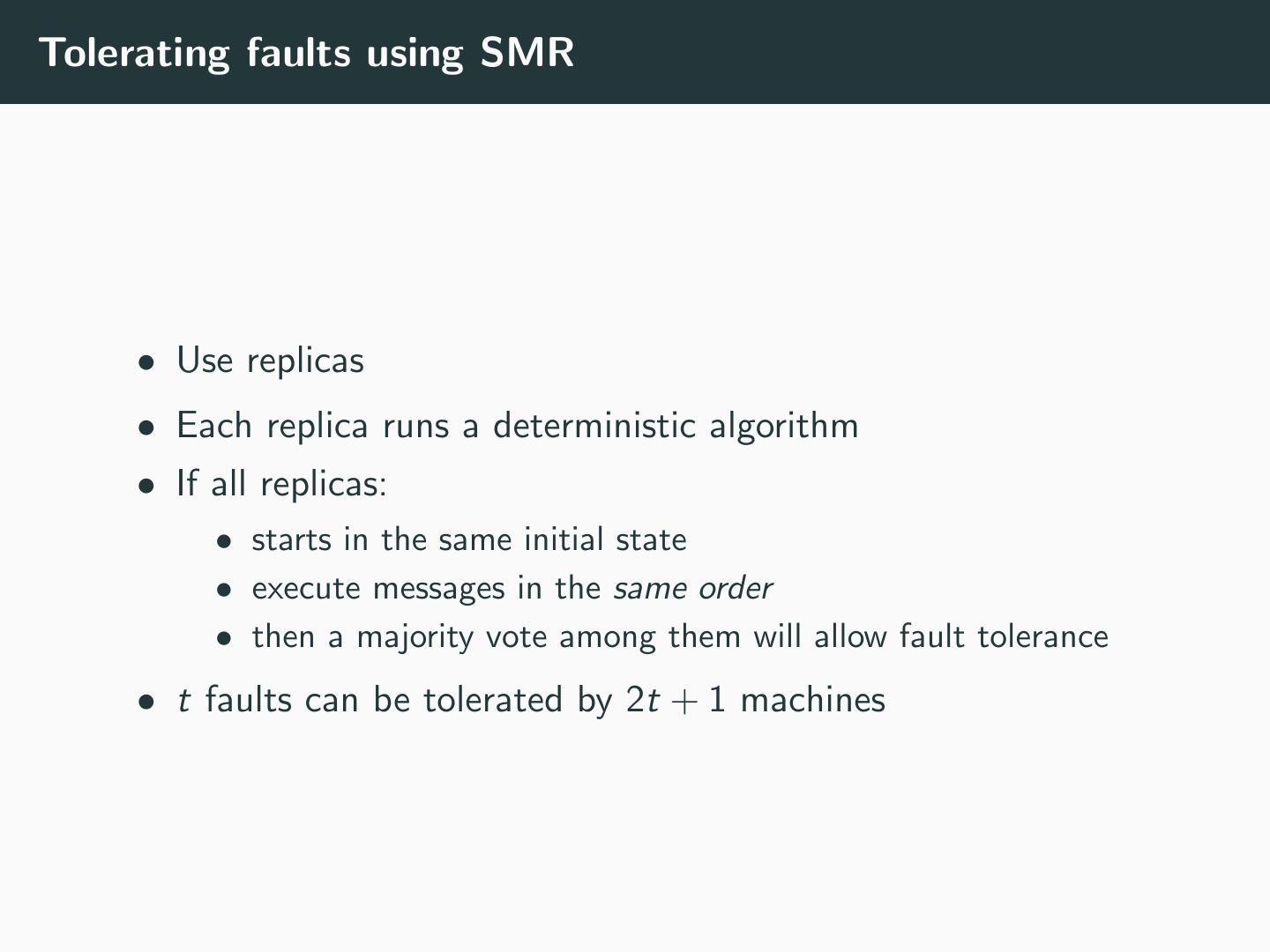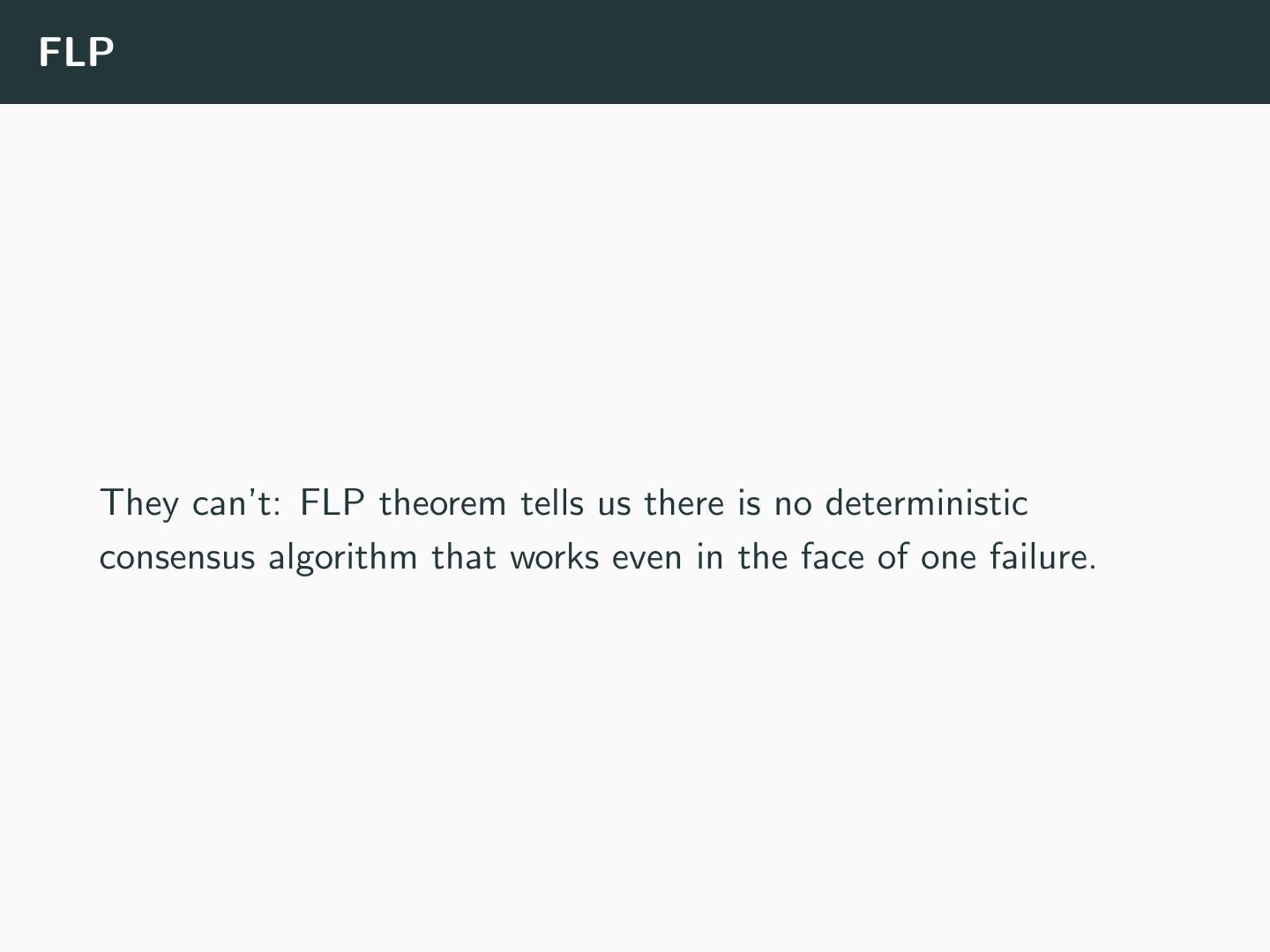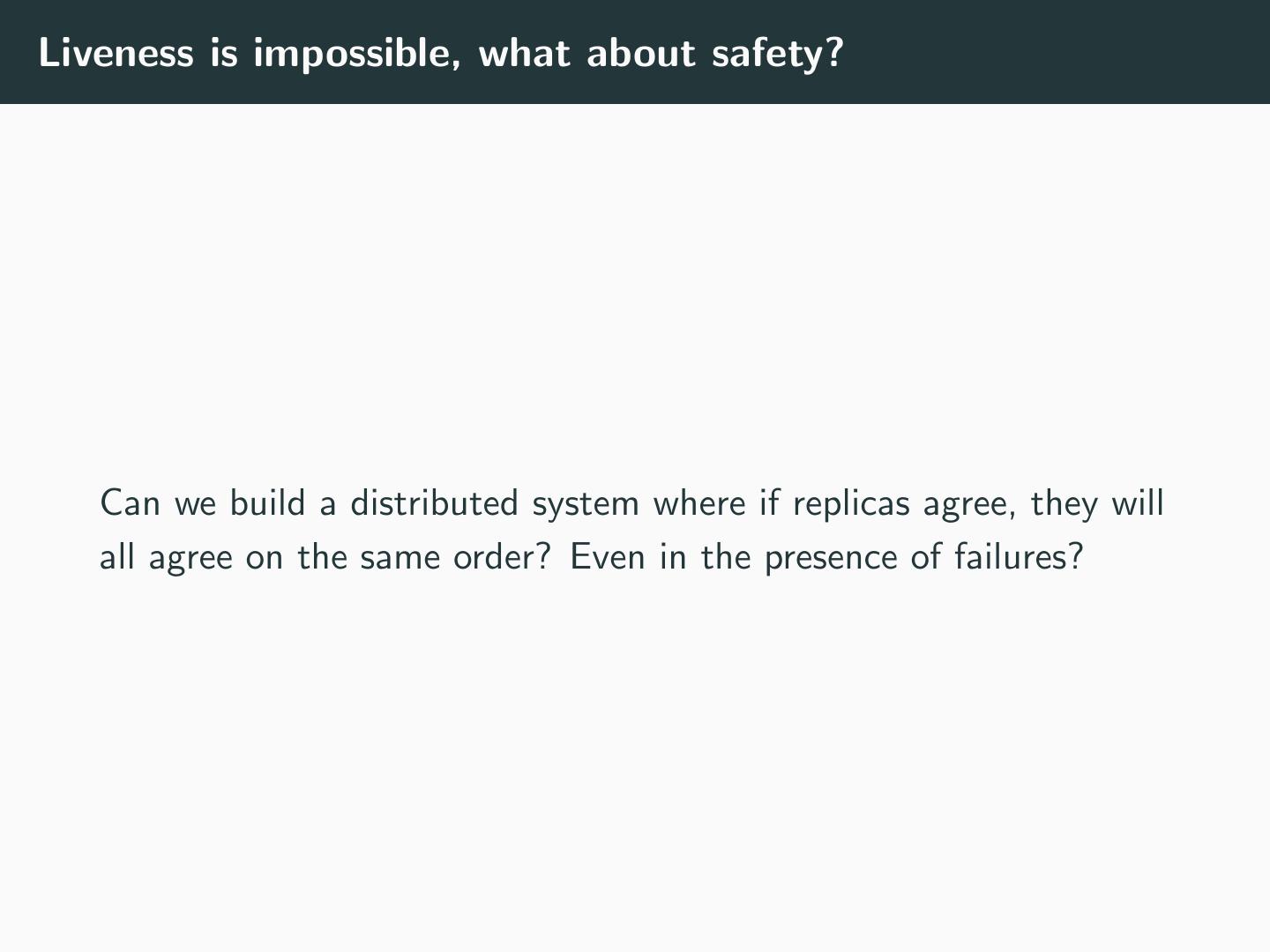- 快召唤伙伴们来围观吧
- 微博 QQ QQ空间 贴吧
- 文档嵌入链接
- <iframe src="https://www.slidestalk.com/u3796/24Paxos96803?embed" frame border="0" width="640" height="360" scrolling="no" allowfullscreen="true">复制
- 微信扫一扫分享
24-Paxos
展开查看详情
1 .CSC2/458 Parallel and Distributed Systems Paxos Sreepathi Pai April 19, 2018 URCS
2 .Outline State Machine Replication (SMR) Paxos
3 .Outline State Machine Replication (SMR) Paxos
4 .Tolerating faults using SMR • Use replicas • Each replica runs a deterministic algorithm • If all replicas: • starts in the same initial state • execute messages in the same order • then a majority vote among them will allow fault tolerance • t faults can be tolerated by 2t + 1 machines
5 .Key problem How can replicas always agree on the same order in the presence of faults? Hint: this is the consensus problem
6 .FLP They can’t: FLP theorem tells us there is no deterministic consensus algorithm that works even in the face of one failure.
7 .What does “works” mean? Recall: To prove FLP, we showed that all algorithms could always get trapped in states where they made no decision.
8 .Liveness is impossible, what about safety? Can we build a distributed system where if replicas agree, they will all agree on the same order? Even in the presence of failures?
9 .Safety/Correctness properties From Lamport (2001): • Only a value that has been proposed may be chosen • Only a single value is chosen • A process never learns that a value has been chosen unless it actually has been
10 .Assumptions • Asynchronous communication • Non-Byzantine Fail-stop failures • However, machines have stable memory that can tolerate failures (why?) • Byzantine failures: arbitrary failures • Messages can take: • delayed, • duplicated • lost • but NOT corrupted
11 .Outline State Machine Replication (SMR) Paxos
12 .Setup • Three classes of “agents” • Proposers: proposes a value v • Acceptors: accepts a value v that is proposed • Learners: learns that a value v was accepted • These agents may be mapped to the same process, so a process could play all three roles
13 .Accepting • As an acceptor, you may accept a value that is not accepted (i.e. not chosen) by the majority. • Multiple proposers, different values • implies multiple rounds of acceptance • But you must accept a value • Single proposer, one value • i.e., you don’t know if there are other proposers
14 .Requirement 1 As acceptor, accept the first proposal you receive, [but also accept multiple proposals, if they have the same value you accepted. ]
15 .Invariants Let proposals have a unique number n in the system n : v . Ensure that if a proposal with value v is chosen (i.e. accepted by majority), then every higher-numbered proposal that is chosen has the value v You can ensure this by: • Acceptors only accept higher-numbered proposals if these have the chosen value v • Proposers only propose v in their higher-numbered proposals if v was chosen • How do we ensure this (esp. if we’re a proposer)?
16 .Invariants The two invariants hold, if when proposal n : v is issued: • no majority set of acceptors has accepted a proposal < n • otherwise, we couldn’t propose n : v unless v was chosen • v has been chosen by a set of acceptors with a proposal < n
17 .The Proposer’s Algorithm • Proposer sends a “prepare” request, using a value n • An acceptor who responds to this message: • promises that it will not accept a proposal < n • if it has already accepted a proposal < n, it sends the value v that has been accepted • If a majority of acceptors respond, a proposal is made (“accept”): • n : v where v is the value of the highest-numbered proposal accepted so far • or is the value of the proposer itself
18 .The Acceptor’s algorithm • An acceptor responds to a prepare if its n is greater than any n it has seen so far • An acceptor accepts a proposal numbered n iff: • it has not responded to a prepare request > n • It can ignore: • prepare requests with n where n < n and it has already responded to prepare n • duplicate prepare requests
19 .Learners • Learners learn chosen value by (e.g.) broadcast • But could also use a single distinguished learner that communicates with other learners
20 .Stable storage • An acceptor must remember n, below which it will not accept • save this before responding to prepare • An acceptor must remember n : v , which it has accepted • save this before accepting • A proposer must remember all proposal numbers it has used in the past • and must not reuse them • save this before proposing
21 .Progress • Proposal p prepares n1 and succeeds • Proposal q prepares n2 > n1 and also succeeds • Causing accepts of p to fail, since majority will not accept n1 < n2 • Proposal p restarts with n3 > n2 • Causing accepts of q to fail, since majority will not accept n2 < n3 • ad infinitum
22 .Distinguished Proposers • To ensure progress, elect a distinguished proposer • Must have access to a majority of acceptors • eventually will have a proposal accepted • ”If enough of the system (proposers, acceptors, communication network) is working properly”, liveness can therefore be achieved... • This is not guaranteed • But safety is guaranteed.
23 .Acknowledgments Lecture largely follows the treatment in Lamport (2001), ”Paxos made simple”




























